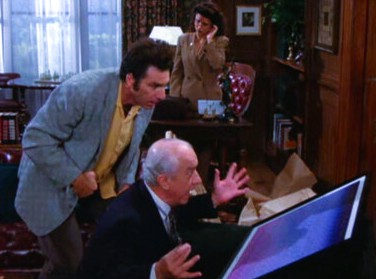It still amazes me that the hit television series Seinfeld has been around for over thirty years. Yet here I am, just as hooked as when it first showed up in my parents’ living room. These days, it’s part of my nightly routine—brush my teeth, say my prayers, then, almost on autopilot, flip on an episode and fall asleep grinning at the same old punchlines. I’ve probably seen every episode more times than I’d care to admit. But they never get old. There’s just something about those characters—their quirks, their mishaps—that always feels a little too familiar.
Thank you for taking the time to read this homily for the feast of the 27th SUNDAY IN ORDINARY TIME (October 5, 2025). Your support means a great deal to me, and I’m deeply grateful for the many who share these messages with their friends, families and social media followers. If you’ve found meaning in these words, I’d be grateful if you’d share them with others who might benefit.
And for those who prefer listening, you can find the audio version on SoundCloud HERE or subscribe to the podcast on iTunes HERE. Your comments, messages, and the way you’ve embraced these homilies continue to inspire me. Sincerely in Christ -Father Ji
One episode that comes to mind features Elaine’s boss, Mr. Pitt. He’s this comically eccentric, uptight, wealthy man who hires Elaine because she reminds him of Jackie Kennedy Onassis—then proceeds to give her the most ridiculous tasks, like finding the perfect socks or removing salt from pretzel sticks. In this particular episode, Jerry’s neighbor Kramer, eccentric in the total opposite way, gives Elaine one of those “Magic Eye” posters—you know, the ones from the ‘90s that look like a chaotic jumble of shapes and colors until, supposedly, a 3D image pops out if you look at it just right.
Mr. Pitt becomes obsessed. He spends hours, face inches from the poster, squinting, contorting, convinced he’s just one trick away from spotting the hidden spaceship that everyone else seems to find so easily. “Just relax, unfocus your eyes!” everyone says. But the more he tries, the less he sees. He gets so caught up in trying to force the magic that Elaine finally smashes the picture to snap him out of it before he goes completely off the rails.
I’ll be honest: I’m Mr. Pitt when it comes to those Magic Eye posters. I’ve tried every technique, every angle, and I’ve never once glimpsed the hidden image. It leaves you wondering—am I broken? Did everyone else get a secret instruction manual?
That whole episode came to mind this week because that sense of frustration—of feeling like you’re missing something essential—is what we hear in today’s Gospel. The disciples come to Jesus feeling like they’re missing some fundamental secret. They’ve watched him perform wonders and want in on the power: “Lord, increase our faith!” they demand. They’re looking for a trick, a hidden formula, a spiritual boost to make their prayers more powerful, their missions more successful. If only I had a little more faith, then maybe I could pull off the miracles Jesus talks about.
Maybe you’ve felt that way, too. You pray fervently, you strive to live faithfully, you check all the spiritual boxes—but the mountain stays put, the tree doesn’t budge, the breakthrough just doesn’t arrive. You start second-guessing: Maybe if I prayed harder, or used the perfect words, or completed enough novenas, or attended enough holy hours—then God would finally respond the way I hope. It’s tempting to treat faith like a technique, a lever to pull for guaranteed results.
But that’s not faith; that’s magic. Magic relies on formulas and control—if I perform the ritual just right, then abracadabra! I bend reality to my will. Faith, on the other hand, is rooted in trust and relationship. It’s not about manipulating God to get what we want; it’s about handing ourselves over into God’s loving hands, aligning with His will rather than demanding ours.
That’s why Habakkuk, who we meet in today’s first reading, is the perfect prophet for us right now. Most Old Testament prophets deliver messages from God—warnings, instructions, promises. But Habakkuk is different. He lets us in on his own struggle with God. His whole book is a back-and-forth, a raw, honest dialogue. He doesn’t just relay divine messages; he brings his complaints, his frustrations, his doubts straight to God. Listen again: “How long, O LORD? I cry for help but you do not listen! I cry out to you, ‘Violence!’ but you do not intervene. Why do you let me see ruin; why must I look at misery? Destruction and violence are before me; there is strife, and clamorous discord.”
You can hear it—Habakkuk is tired. He’s angry. He’s not afraid to wrestle with God, to ask why nothing is changing, to wonder if his prayers matter at all.
And what does God do? He doesn’t shut him down. He doesn’t say, “Just believe harder,” or “Get with the program.” Instead, He answers gently: “The vision still has its time… if it delays, wait for it, it will surely come.” God doesn’t promise instant fixes or magical solutions—He invites Habakkuk, and us, to patient trust, a persistent hope grounded in real relationship. The just, Habakkuk learns, live by faith, not by forcing outcomes.
So when the disciples ask Jesus to “increase our faith,” he responds in a way that can almost feel frustrating. “If you had faith the size of a mustard seed, you could say to this mulberry tree, ‘Be uprooted and planted in the sea,’ and it would obey you.” At first, it sounds like he’s saying, “You don’t even have the tiniest bit.” But that’s not it at all. Jesus is freeing them—and us—from quantity-obsessed thinking. It’s not about amassing more faith like points in a game; it’s about the quality of faith—a humble, mustard-seed trust in God’s power and timing. True faith acknowledges that if the tree moves, it’s because God wills it—not because we’ve mastered a spiritual hack. And if it doesn’t? That’s not a failure of faith; it’s an invitation to trust God’s greater wisdom.
This brings us to St. Paul’s message to Timothy. Paul tells him, “Stir into flame the gift of God that you have.” Notice, Paul doesn’t say, “Work harder. Be more confident in yourself. Manufacture more positivity.” No—Paul points Timothy back to the real source of confidence: “God did not give us a spirit of cowardice but rather of power and love and self-control.” Our confidence isn’t in ourselves, as if faith is just a matter of self-improvement or pumping ourselves up. Our confidence is in God, in the gifts He’s already given us—especially the gift of His Holy Spirit living within us.
That’s a radical shift. We’re not called to “self-confidence” as the world defines it, as if everything depends on us. We’re called to confidence in God. The Holy Spirit—the very breath of God—dwells in you. That is the source of your strength, your peace, your hope. And even when your faith feels tiny—just a mustard seed—remember it’s God who makes seeds grow. It’s God who moves mountains and trees if He wills it. Our job isn’t to perform spiritual magic tricks or chase results to prove our faith. Our job is to surrender, to trust, to stay close to God—especially when things don’t make sense.
So what do we do with all this? Maybe it’s time to stop squinting at the Magic Eye poster of our lives, desperate for the trick that will make everything fall into place. Maybe it’s time to let go of the anxiety that we’re missing out, that if we just did a little more, tried a little harder, prayed a little better, we’d finally see what others see. Maybe it’s time to be honest with God, like Habakkuk—to bring him our confusion, our pain, our questions, and trust that He welcomes the conversation.
Because faith isn’t about results. It’s about relationship. It’s about showing up, day after day, even when the picture doesn’t make sense. It’s trusting that God is at work—even when, like Habakkuk, we have more questions than answers. Even when, like Mr. Pitt, we can’t see what everyone else claims is right in front of us.
So tonight, when you brush your teeth, say your prayers, and maybe flip on a Seinfeld rerun, remember Mr. Pitt and the Magic Eye. Remember Habakkuk, wrestling with God. Remember Timothy, stirred by St. Paul to fan the flame within. And remember: You don’t have to see the whole picture for it to be real. You don’t have to force results to prove your faith. You just have to trust—trust in the One who sees it all, knows it all, and loves you through it all.
Let’s ask God for that kind of faith—not faith in magic, but faith that keeps showing up. Not self-confidence, but confidence in the gifts and the Spirit He’s already placed within us. Not the faith that demands answers, but the faith that stays in the conversation, believing that God’s vision will not disappoint.
And maybe—just maybe—one day you’ll look back and realize the miracle wasn’t that you finally saw the hidden image, but that God was present with you all along, shaping you, holding you, and gently bringing His picture to life—one small seed, one honest prayer, one faithful step at a time.











